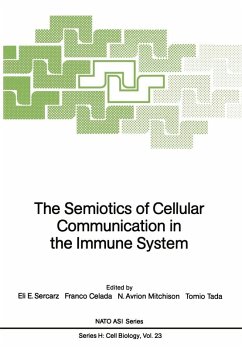
The Immune Synapse as a Novel Target for Therapy (eBook, PDF)
Versandkostenfrei!
Sofort per Download lieferbar
Statt: 106,99 €**
72,95 €
inkl. MwSt.
**Preis der gedruckten Ausgabe (Gebundenes Buch)
Alle Infos zum eBook verschenkenWeitere Ausgaben:

PAYBACK Punkte
36 °P sammeln!
It is now accepted that T cell activation by an antigen-presenting cell requires the organization of a supramolecular structure - the immune synapse. This structure, with different types of molecules spatially segregated, is involved in the delivery of quantitative and qualitative signals critical for T cell activation, and therefore in controlling the nature of the immune response. This volume discusses the progress in manipulating components of the immune synapse as a strategy to regulate the immune response in immune pathology, such as transplantation, autoimmunity and allergy. Donnadieu re...
It is now accepted that T cell activation by an antigen-presenting cell requires the organization of a supramolecular structure - the immune synapse. This structure, with different types of molecules spatially segregated, is involved in the delivery of quantitative and qualitative signals critical for T cell activation, and therefore in controlling the nature of the immune response. This volume discusses the progress in manipulating components of the immune synapse as a strategy to regulate the immune response in immune pathology, such as transplantation, autoimmunity and allergy. Donnadieu reviews the current knowledge on the molecular composition and organization of the immune synapse and how the formation of this structure can be modulated by chemokines. It is also known that the immune synapse formation is critical for the activation of naive T cells, as well as their functional polarization. The second chapter discusses the conversion of naive T cells into regulatory T cells (Treg) when components of the immune synapse are manipulated in such a way that the T cells receive suboptimal activation signals.
Dieser Download kann aus rechtlichen Gründen nur mit Rechnungsadresse in A, B, BG, CY, CZ, D, DK, EW, E, FIN, F, GR, HR, H, IRL, I, LT, L, LR, M, NL, PL, P, R, S, SLO, SK ausgeliefert werden.












